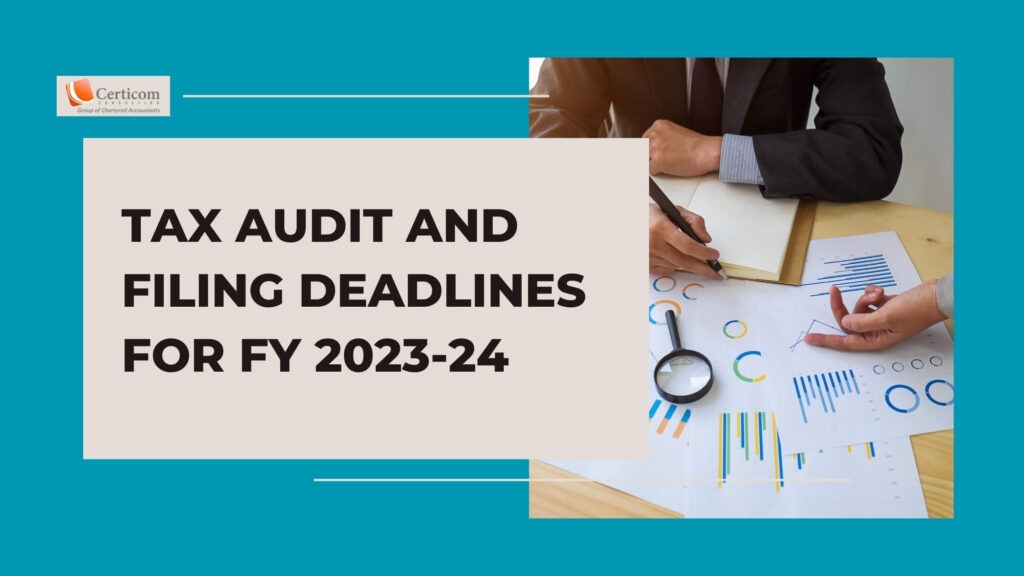Tax Audit and Filing Deadlines for FY 2023-24

As the financial year 2023-24 progresses, taxpayers must be mindful of their obligations under the Income Tax Act, particularly regarding tax audits. Tax audits serve a critical role in ensuring the accuracy of financial records and compliance with tax laws. They help curb tax evasion by verifying the income tax returns (ITRs) filed by taxpayers, especially those with significant business or professional income.
What is a Tax Audit?
A tax audit is an examination of a taxpayer’s books of accounts from an income tax perspective. It is conducted by a practicing Chartered Accountant (CA) to verify the correctness of the income declared and expenses reported in the income tax return. The audit ensures compliance with tax laws and discourages underreporting of income or overstating of expenses to lower tax liabilities.

Who Needs to Conduct a Tax Audit?
Several categories of taxpayers are required by law to get their accounts audited and submit an audit report. Below are the key groups:
Taxpayers with Business Income
- If the turnover or gross receipts of a business exceed Rs 1 crore in a financial year, the taxpayer must get their accounts audited.
- In the case of businesses opting for the presumptive taxation scheme under Section 44AD, a tax audit is required if their turnover exceeds Rs 2 crore.
Taxpayers with Income from Goods Carriages (Section 44AE)
Taxpayers earning from plying, hiring, or leasing goods carriages need to get their accounts audited if the presumptive income under Section 44AE is less than their actual income and their turnover exceeds Rs 10 lakh.
Taxpayers with Professional Income
Professionals such as doctors, chartered accountants, and lawyers must get their accounts audited if their gross receipts exceed Rs 50 lakh in a financial year.
- Even if the gross receipts are below Rs 50 lakh, professionals must get a tax audit if they claim profits lower than 50% of their gross receipts under the presumptive taxation scheme.
Other Conditions for Tax Audit
Taxpayers opting for the presumptive taxation scheme under Section 44AD must follow the scheme for five consecutive years. If they fail to meet the conditions and their total income exceeds the exempt threshold, they must get their accounts audited under Section 44AB. Additionally, if a business reports profits below the specified threshold, a tax audit becomes mandatory.
Important Deadlines for FY 2023-24
Tax Audit Report Submission:
The deadline for submitting the tax audit report for FY 2023-24 (AY 2024-25) is September 30, 2024. For businesses subject to transfer pricing audits, the deadline extends to October 31, 2024.Income Tax Return Filing:
For taxpayers who are required to submit a tax audit report, the deadline to file the ITR is October 31, 2024.

Exceptions to Tax Audit Requirement
Certain taxpayers are exempt from conducting a tax audit under Section 44AB. If a taxpayer is already required to audit their accounts under another law (e.g., the Companies Act), they don’t need to undergo a separate audit for income tax purposes. Instead, they can file the audit report under that law, along with the prescribed tax audit forms (Form 3CA and Form 3CD).
Additionally, professionals with gross receipts of up to Rs 75 lakh are exempt from the tax audit requirement, provided their cash receipts are less than or equal to 5% of their total gross receipts.
Tax audits are essential for ensuring transparency and accuracy in financial reporting, particularly for businesses and professionals with significant income. Timely submission of the tax audit report and filing of the ITR by the respective deadlines helps avoid penalties and ensures compliance with the law. For FY 2023-24, the key dates to remember are September 30, 2024, for tax audit report submission and October 31, 2024, for ITR filing.
Related Post
Cost Inflation Index for FY 2025-26: Impact on LTCG Tax
Loan Interest Deductions: How to Claim and Avoid Tax Scrutiny
Book A One To One Consultation Now For FREE
How can we help? *




